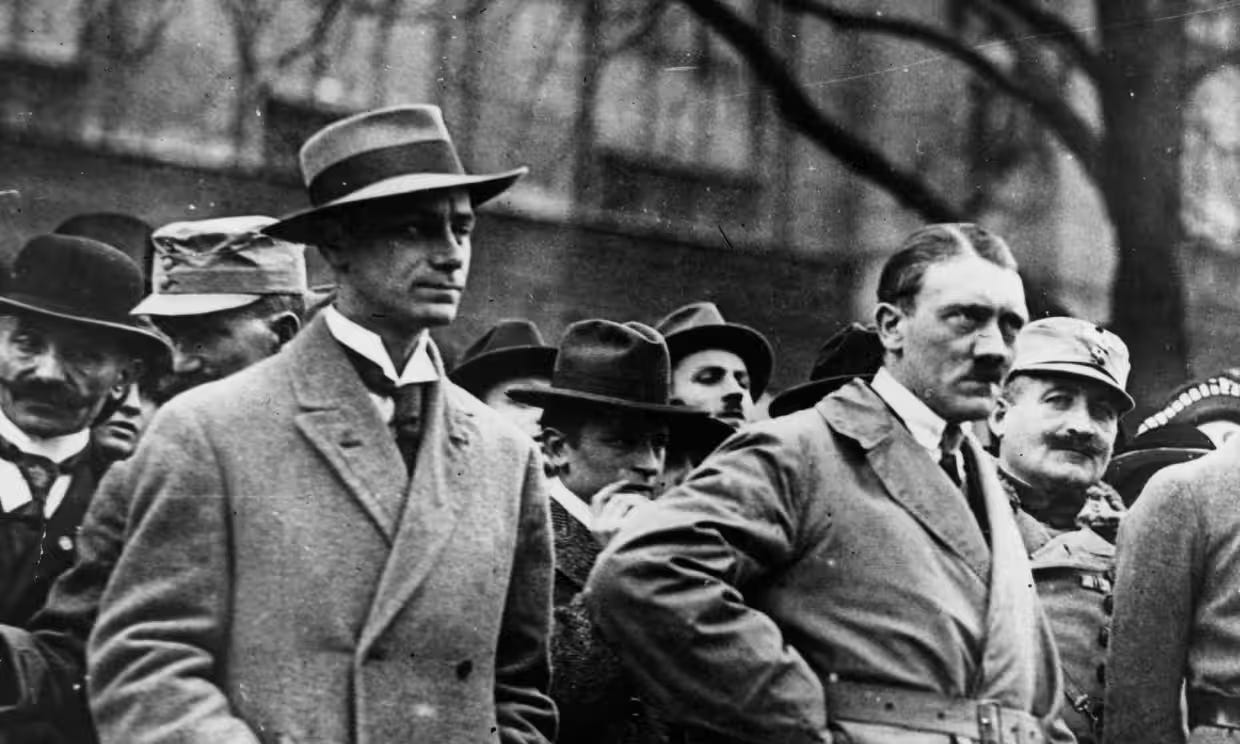As he immersed himself in right-wing ideas in the 1920s, Dürckheim could not know what the future held. Later in life he would describe himself as ‘apolitical,’ neither ‘Nazi’ nor ‘anti-Nazi.’ Despite this, he effectively spent the decade preparing himself for life in Hitler’s Germany.
When the Nazi party seized control of Germany in 1933, then, Dürckheim saw it as a triumph. ‘Through Adolf Hitler,’ he wrote, ‘the Gods have given to the German People the power to awaken fellow Germans in an infectious movement and transform them towards this new man.’ With such convictions, he immediately joined the Brownshirts. He enthusiastically published articles on Nazi philosophy in journals called Community, and Purpose and Value as Constituents of Meaningful Action. The Nazi ideology quickly became his own and he, an eloquent defender of its tenets. In a 1934 piece he summarised his views. Like Alfred Rosenberg, a chief Nazi ideologist, Dürckheim believed the German people were united by their ‘racially-conditioned soul,’ the völkisch spirit they shared due to their organic connection through common blood and soil. Dürckheim also believed Germans had a duty to protect their race-soul by casting out ‘foreign bodies.’ He felt all must discard their selfish, individualistic concerns, and militantly devote themselves to manifesting this divine force in the world. Dedication to the race soul was a German’s ‘holy duty’, he thought. Only total submission to the logic of race could restore the German people’s power and perfection, lost when the Empire fell. He implored work and action as a response to collapse and melancholy—narcissism as a remedy for shattered self-esteem.
A perverted will to power, the Nazis believed, would restore the ego and the world. Dürckheim, like so many other Germans, followed Rosenberg’s ideas and made race the ‘guiding star of his existence’. And his dedication was handsomely rewarded. With his talents for Nazi philosophy and propaganda, Dürckheim rapidly climbed the ranks of the Nazi party. By 1935, he was chief assistant to Joachim von Ribbentrop— Germany’s wartime Foreign Minister and the first war criminal hanged at Nuremberg. He had also met with foreign leaders including Winston Churchill.
But in 1938, a complication arose—the Nazis discovered Dürckheim had Jewish ancestry. His political ambitions in Germany were shattered.
In what now looks like a moment of uncharacteristic mercy from the Nazis, they said Dürckheim could continue to work for the Nazi cause if he moved to Japan to work as a cultural envoy. Nazi anti-Semitism had now harmed him directly. Dürckheim, however, remained a believer in the cause. He agreed to his new posting and promptly left for Japan.
In Japan, Dürckheim redoubled his commitment to Nazi ideology. Dürckheim was deeply impressed by Japan’s strong military culture and its people’s sense of discipline. Like Hitler, he felt that Germany could learn from the Japanese, who saw ‘sacrifice for the Fatherland as the highest good.’ So he worked ‘day and night’ to synthesise German and Japanese völkisch beliefs. He wrote pamphlets, he gave speeches across the country. Over time he developed an esteemed reputation; people named him the ‘Rosenberg of the East.’ And eventually, in 1944, the Nazi party recognised his efforts and awarded him one of their highest honours—the War Merit Cross.
But within 18 months, everything had changed. Both the German and the Japanese were defeated. Tokyo and Dresden had burned. A manmade sun had twice flashed over Japan. Its light reduced men to scorch marks, boiled the eyes from the skulls of those who dared to tilt their heads back to look at the burning sky. The Nazis were dead, the fascists were done. And Dürckheim, that avid Nazi whose ideals had now disintegrated for the second time in his life, had been locked away in a Japanese prison.
It was there, plunged into terror and sadness, his life threatened again, that his mind started to move once more.
References
Baier, K. (2013) The Formation and Principles of Count Dürckheim’s Nazi Worldview and his Interpretation of Japanese Spirit and Zen. The Asia-Pacific Journal, 11(48), pp.1-33.
Haffner, S. (2014) Defying Hitler: A Memoir. Lexington, MA, Plunkett Lake Press.
Joachim-Bieber, H. (2015) Zen and War: A Commentary on Brian Victoria and Karl Baier’s Analysis of Daisetz Suzuki and Count Dürckheim. The Asia-Pacific Journal, 13(20), pp.1-15.
Victoria, B. (2013) A Zen Nazi in Wartime Japan: Count Dürckheim and his Sources: D.T. Suzuki, Yasutani Haku’un and Eugen Herrigel. The Asia-Pacific Journal, 12(3), pp.1-52.
Wehr, G. (1997) Karlfried Graf Dürckheim: Une vie sous la signe de la transformation. Paris, Éditions Albin Michel.







